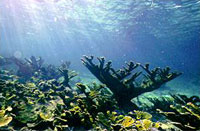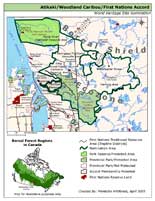
News |
- Climate Change Action Remains a Priority
- Park Reserves Extended - Manitoba Conservation
- Nestle Withdraws Bottled Water Proposal
- US Sets Fuel and Emission Standards
- Manitoba Wildlands Surveys Candidates for Premier
- Mountaintop Mining Permits Under Review
- Nature Can Solve Climate Challenges
- Wind Could Supply China's Energy Demands
- Population Grows in Face of Changing Climate
- Cape Wind Controversy
- Doer Changes World Heritage Site Target
- Quebec to Conserve the Boreal
| Climate Change Action Remains a Priority | 9 October 09 |
 A recent international poll found that despite the current economic recession, concern over climate change remains a priority. Over 60 percent of people around the world believe combating climate change will be good for the economy. A recent international poll found that despite the current economic recession, concern over climate change remains a priority. Over 60 percent of people around the world believe combating climate change will be good for the economy.
International polling firm GlobeScan, surveyed 20,000 people from 19 countries in Africa, Asia Pacific, Europe, North America and Latin America. The poll found 88 percent considers climate change to be "very serious" or "somewhat serious" problem. Majorities in 14 of 19 countries surveyed believe investing in renewable energy, energy efficiency and public transportation are good for the economy. A similar number supported government action to address climate change despite negative economic impacts. "The best science and the best economics have been telling governments for some time that fast and decisive action is needed on climate change. Now leaders know that if they seal a good and transformative deal in Copenhagen, they will also have the majority of public opinion on their side too." said Achim Steiner, UN Under-Secretary and Executive Director of the UN Environment Programme. View September 17, 2009 GlobeScan media release (PDF)View September 17, 2009 AZoCleantech article View September 28, 2009 Business Daily article View United Nations Environment Programme website Sources: GlobeScan, UNEP |
|
 Print version Print version |
Top |
| Park Reserves Extended - Manitoba Conservation | 2 October 09 |
 Chitek Lake Park Reserve, and Poplar-Nanowin Rivers Park Reserve have both seen their protected lands designation extended for five years as of September 28, 2009, under Manitoba's Parks Act. Chitek Lake Park Reserve, and Poplar-Nanowin Rivers Park Reserve have both seen their protected lands designation extended for five years as of September 28, 2009, under Manitoba's Parks Act.
Both park reserves were nominated as protected lands for Manitoba's Network of Protected Areas in 1998. Skownan First Nation requested protection from development for an area 3 times the park reserve size, a lands scope endorsed by the Manitoba Mining sector. Poplar River First Nation's nomination was for their traditional territory of 800,000 ha. Manitoba's Mining sector also agreed to this designation. The new regulation means interim protection for these park reserves will be in place from 1999 to September 2014. Poplar River First Nation's lands management plan was the first, and is the only community based traditional lands plan from a First Nation on Manitoba's east side. Gaile Whelan Enns, Manitoba Wildlands director commented, "It is unfortunate these extensions were required. Manitoba needs to both establish new protected areas in our boreal forest regions, and finalize decisions and planning for all interim protection designations." View September 28, 2009 Regulation (PDF)Visit Poplar River First Nation web site View Chitek Lake Park Reserve backgrounder (PDF) View Poplar Nanowin Rivers Park Reserve backgrounder Sources: Manitoba Government |
|
 Print version Print version |
Top |
| Nestle Withdraws Bottled Water Proposal | 2 October 09 |
 Nestle, the largest bottled-water company in America, is ditching plans to build a controversial facility in Northern California that would have pumped 200 million gallons of water a year from three glacier-fed natural springs. Nestle, the largest bottled-water company in America, is ditching plans to build a controversial facility in Northern California that would have pumped 200 million gallons of water a year from three glacier-fed natural springs.
Nestle signed a contract in 2003 to build a 1 million-square-foot facility in McCloud, CA. Earlier this month, Nestle pulled out completely stating they had another site secured in Sacramento closer to customer markets. McCloud Watershed Council, along with groups like Food and Water Watch and Corporate Accountability International, have fought the plant claiming the deal was made without proper environmental evaluation and little public notice. There is an increasing trend against allowing private corporations to bottle public water. In Canada the Blue Communities Project at the Council of Canadians builds on the work of Water Watch to protect public water services and challenge the bottled water industry. At the same time many government agencies, cities, and large public service organizations have stopped serving bottled water in their events, reverting back to tap water instead. View September 23, 2009 BusinessWeek articleView September 24, 2009 WaterTech Online article View September 15, 2009 AlterNet article Visit Blue Communities Project Sources: Business Week, Water Tech Online, Council of Canadians |
|
 Print version Print version |
Top |
| US Sets Fuel and Emission Standards | 2 October 09 |
 The Obama Administration has released national fuel economy standards and the first-ever greenhouse gas standard for cars and trucks sold in the United States. The Obama Administration has released national fuel economy standards and the first-ever greenhouse gas standard for cars and trucks sold in the United States.
Both environmentalists and industry lobby groups support the proposed regulation that calls for a 5 percent increase in fuel economy standards per year starting with a fleet wide average of 27.3 mpg in 2011, ending with 35.5 mpg by 2016. The regulation prevents release of 950 million tonnes of greenhouse gas emissions over four years. In addition, new cars would have to reach an average of 250 grams of carbon emitted per mile driven by 2016. The White House will publish final rules by March 30, 2010. "These standards would help consumers save money at the gas pump; help the environment and decrease our dependence on oil -- all while ensuring that consumers still have a full range of vehicle choices." said Transportation Secretary Ray LaHood View Proposed Rulemaking to Establish Light-Duty Vehicle Greenhouse Gas Emission Standards and Corporate Average Fuel Economy Standards: Proposed Rule (PDF)View September 17, 2009 Matter Network article View September 15, 2009 New York Times article View September 15, 2009 National Resources Defense Council article View September 15, 2009 Auto Alliance article Sources: Matter Network, New York Times |
|
 Print version Print version |
Top |
| Manitoba Surveys Candidates for Premier | 28 September 09 |
 When Garry Doer announced his resignation as premier in Manitoba he put in motion the steps for The Manitoba New Democratic Party (NDP) members to select the new Leader of their party, who then becomes the next Premier of Manitoba. When Garry Doer announced his resignation as premier in Manitoba he put in motion the steps for The Manitoba New Democratic Party (NDP) members to select the new Leader of their party, who then becomes the next Premier of Manitoba.
The date for the next election in Manitoba, according to the Elections Act, will be in October 2011, four years after the previous province wide election. That means the NDP leader who replaces Mr. Doer as Premier of Manitoba will be in office until October 2011. Manitoba Wildlands is sending a survey of environmental questions, mostly about lands, waters, and climate to each of the candidates for leader/premier. We will post their answers in ten days time. View Manitoba Wildlands NDP Leadership Survey Questions (PDF) |
|
 Print version Print version |
Top |
| Mountaintop Mining Permits Under Review | 24 September 09 |
 The United States Environmental Protection Agency (EPA) has announced it will hold back permits for 79 proposed mountaintop coal-mining projects in Appalachian states. If the permits were approved, coal companies would remove 60,000 acres of diverse hardwood forests and fill hundreds of miles of streams in mining waste. The United States Environmental Protection Agency (EPA) has announced it will hold back permits for 79 proposed mountaintop coal-mining projects in Appalachian states. If the permits were approved, coal companies would remove 60,000 acres of diverse hardwood forests and fill hundreds of miles of streams in mining waste.In an effort to protect waterways from coal mining waste, the EPA will work with the Army Corps of Engineers to conduct detailed reviews of pending permits and ensure compliance with the Clean Water Act. "Hopefully the Administration sees that the risks to health and environment from blowing up mountains are not worth the 7% coal we get from mountaintop removal mining" said Michael Brune, Executive Director of Rainforest Action Network (RAN). Mountaintop mining provides four percent of the nation's coal and has already destroyed 500 mountains, more than 1 million acres of forest and more than 1,200 miles of streams. View September 11, 2009 NRDC articleView September 9, 2009 EPA news releases View September 11, 2009 Center for Biological Diversity article View September 11, 2009 Mother Nature Network article View September 11, 2009 Rainforest Action Network article Sources: Common Dreams, EPA, Mother Nature Network |
|
 Print version Print version |
Top |
| Nature Can Solve Climate Challenges | 24 September 09 |
 Investing in natural areas, forests and coral reefs could have huge economic benefits. A new study highlights the economic value of our natural assets and suggests an investment of $45 billion in protected areas could save nature-based services worth $4.5 to $5.2 trillion a year. Investing in natural areas, forests and coral reefs could have huge economic benefits. A new study highlights the economic value of our natural assets and suggests an investment of $45 billion in protected areas could save nature-based services worth $4.5 to $5.2 trillion a year.The study by The Economics of Ecosystems and Biodiversity (TEEB) found natural systems are crucial in fighting climate change. Germany and the European Commission launched the study, part of a global project to be published in 2010. "The disproportion of investments in technological fixes versus investing in nature's ready-made solutions, tried and tested over millions of years, is one of the great oversights of the 20th century," said Achim Steiner, Executive Director of the U.N. Environment Programme. Tropical forests provide services worth an estimated $6,120 per hectare a year in food, building materials, carbon sequestration, biodiversity, water purification and opportunities from tourism. Coral reefs are worth up to $170 billion a year by providing nurseries for fish and protecting coasts from storms. Investing in natural areas needs to be a key priority for governments attending the U.N. climate convention in Copenhagen this December. View The Economics of Ecosystems & Biodiversity September 2009 report (PDF)View September 10, 2009 Planet Ark article View September 2, 2009 Reuters article View September 8, 2009 Treehugger article View September 7, 2009 Medindia article Sources: Reuters, Planet Ark |
|
 Print version Print version |
Top |
| Wind Could Supply China's Energy Demands | 24 September 09 |
 China is the world's top emitter of carbon dioxide with hundreds of new coal-fired power plants brought online every year to meet growing energy needs. A new study suggests a shift to wind power could accommodate all electricity demands projected for 2030. China is the world's top emitter of carbon dioxide with hundreds of new coal-fired power plants brought online every year to meet growing energy needs. A new study suggests a shift to wind power could accommodate all electricity demands projected for 2030.Researchers from Harvard and Tsinghua University in Beijing studied the practicality of switching to wind power, a move that would cut carbon dioxide emissions by 30 percent. By examining global meteorological data and local geographical restrictions researchers determined a network of wind turbines operating at only 20 percent capacity could produce seven times China's current energy consumption. About 80 percent of China's electricity comes from coal, with only 0.4 percent wind. China plans to build seven large wind-power bases over the next 10 years and already ranks forth in the world in terms of installed wind capacity. The study suggests $900 billion is needed over 20 years to shift to wind and upgrade electric grids. View September 11, 2009 ScienceMag.org report excerptView September 10, 2009 AlterNet article View September 10, 2009 CBC article View September 10, 2009 Associated Press article View September 14, 2009 Reuters article Sources: Reuters, CBC, Associated Press |
|
 Print version Print version |
Top |
| Population Grows in Face of Changing Climate | 24 September 09 |
 The world's population surpassed 6.8 billion in early 2009, with no significant slowing in the pace of growth in recent years. Estimates by the United Nations Population Division indicate that humanity has been consistently gaining more than 79 million people--a population almost the size of Germany's--each year since 1999. The world's population surpassed 6.8 billion in early 2009, with no significant slowing in the pace of growth in recent years. Estimates by the United Nations Population Division indicate that humanity has been consistently gaining more than 79 million people--a population almost the size of Germany's--each year since 1999.Indicators including decreased assistance for family planning services, fertility levels well above replacement levels, and improvements in life expectancy for people living with HIV point to a human population that is growing more rapidly than expected. One variable not taken into account in population projections is the impact of global climate change, which will likely affect people in developing countries the most. View September 17, 2009 World Watch Institute articleView Vital Signs analysis, Population Growth Steady in Recent Years Sources: WorldWatch Institute |
|
 Print version Print version |
Top |
| Cape Wind Controversy | 17 September 09 |
 Developers are lining up to start a network of wind farms along the Atlantic seaboard in the United States. Some projects have been delayed by controversy. Developers are lining up to start a network of wind farms along the Atlantic seaboard in the United States. Some projects have been delayed by controversy.The Cape Wind project in Massachusetts is slated to become the first wind farm in the area and would provide the majority of power to Cape Cod and surrounding islands. Covering 25 square miles, the Cape Wind project would consist of 130 wind turbines. The Aquinnah and Mashpee Wampanoag Tribes say the windmills would obstruct scenic views and threaten cultural, religious and archaeological sites. Earlier this year, the United South and Eastern Tribes (USET), a coalition of 25 federally recognized Tribes in the United States passed a resolution calling for a halt to any further action on the Cap Wind project due to impacts on culturally important sites. The area is also an important breeding ground for several endangered birds and part of the Atlantic Flyway, one of the largest migratory bird routes in the world. View Save our Sound - The Cape Wind Project websiteView September 2, 2009 Mobilization for Climate Justice article View United South and Eastern Tribes, Inc. Resolution (PDF) View September 6, 2009 Chicago Tribune article View September 9, 2009 New York Times article View August 28, 2009 Vineyard Gazette article View United South and Eastern Tribes website View December 16, 2005 New York Times article View January 12, 2009 Grist article Source: Save Our Sound, Act for Climate Justice, New York Times |
|
 Print version Print version |
Top |
| Doer Changes World Heritage Site Target | 16 September 09 |
|
Gary Doer made an announcement about the boreal world heritage site (WHS) for the east side of Manitoba before public knowledge that he is now Canada's Ambassador to the US. First Nations in both Manitoba and Ontario, with the governments of Ontario, Manitoba and Canada, are working toward establishment of a 4 million hectare boreal world heritage site. The idea was contained in the 2002 Accord among the First Nations. The site is also on Canada's official short list of future WHS. The list was released in 2004 and applies for 10 years from that date. Manitoba government support was announced November 2004. In his speech to the August national NDP convention in Halifax, Nova Scotia Mr. Doer said: "It will take us another 10 years to get that site set up as a World Heritage Site. It will take longer but it will be more sustainable for the people living in that area and more sustainable for our planet." Gaile Whelan Enns, director of Manitoba Wildlands, commented: "I don't think any of the communities, government staff, or other partners in the WHS are aware of this decision, this delay. We assume the Manitoba government's moratorium on any developments that would affect lands to be included in the WHS will also be extended. This must mean funding to assist the communities with technical work for the WHS will also continue for the new ten year period." Requests from First Nations involved in the WHS for protection from development of traditional lands remain outstanding, some from ten years ago. View Gary Doer's August 14, 2009 speech at NDP conventionView Proposed World Heritage Maps Source: Manitoba Wildlands |
|
 Print version Print version |
Top |
| Quebec to Conserve the Boreal | 16 September 09 |
 In a letter to Premier Jean Charest more than 500 scientists and conservation professionals called on the Quebec government to fulfill its commitment to protect half of northern Quebec, basing all decisions on sound scientific data. In a letter to Premier Jean Charest more than 500 scientists and conservation professionals called on the Quebec government to fulfill its commitment to protect half of northern Quebec, basing all decisions on sound scientific data. In March 2009 Quebec pledged to protect 50 percent of the land north of the 49th parallel from industrial, mining and energy development. Under Plan Nord, the other half would be "held to sustainable standards". "The government of Quebec has shown us a vision for protecting this world-class resource," said Mat Jacobson of the Pew Environment Group. "As a next step, we recommend establishing a planning process that engages Aboriginal people and stakeholders, using science, traditional knowledge and local perspectives to conserve ecological and cultural integrity while fostering healthy regional economies." The Boreal forest is one of the richest ecosystems left in the world and home to woodland caribou, wolverine and golden eagle, all species threatened with extinction. View Letter From Scientists Regarding the Boreal Forest (PDF)View September 10, 2009 Boreal Canada article View September 10, 2009 Canwest News Service article View September 13, 2009 Mongabay article Source: Canadian Boreal Initiative, CanWest News Service, Mongabay |
|
 Print version Print version |
Top |


 RSS Feeds:
RSS Feeds:
